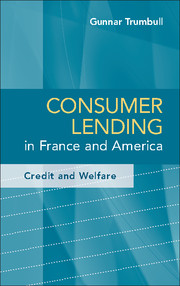Book contents
- Frontmatter
- Dedication
- Contents
- Figures and Tables
- 1 Introduction
- 2 Commercial Banks and Consumer Credit in the United States
- 3 Banks against Credit
- 4 American Retailers and Credit Innovation
- 5 Selling France on Credit
- 6 Credit and Reconstruction
- 7 The Politics of Usury
- 8 Credit for Being American
- 9 Deregulation and the Politics of Overindebtedness
- 10 Credit and Welfare
- Index
- References
10 - Credit and Welfare
Published online by Cambridge University Press: 05 August 2014
- Frontmatter
- Dedication
- Contents
- Figures and Tables
- 1 Introduction
- 2 Commercial Banks and Consumer Credit in the United States
- 3 Banks against Credit
- 4 American Retailers and Credit Innovation
- 5 Selling France on Credit
- 6 Credit and Reconstruction
- 7 The Politics of Usury
- 8 Credit for Being American
- 9 Deregulation and the Politics of Overindebtedness
- 10 Credit and Welfare
- Index
- References
Summary
Over the course of almost a century, American households were taught to approach consumer credit as socially progressive and economically virtuous. By the 1990s, household credit was viewed on both the left and right of the political spectrum as an effective tool for improving poor households’ access to economic prosperity. The idea that free access to financial markets could play a role in generating social equality dominated the third-way politics of the Bill Clinton presidency, and carried through seamlessly to the George Bush presidency under the new label of the ownership society. To some degree, the focus on financial markets as a boon to the working poor simply made a virtue of necessity. As tax rates fell, rising social demands met declining government revenues, and the political left turned to the markets to finance its social goals. It legalized gambling so that the winnings could go to support education. It embraced housing and financial assets as a means to invest for future retirement – an approach that came to be known as asset-based welfare. Expanded access to consumer credit was one piece of a broader societal project that included home ownership, private retirement funds, and stock market investments.
The surprise of these market-welfare policies of the Clinton and Bush administrations was that they did not generate a strong backlash. Household debt increased dramatically through the 1990s, and poorer households no longer enjoyed those benefits that had softened the financial costs for earlier borrowers. Above all, the cross-subsidy for poorer households had disappeared; in fact, they had reversed. From the late 1980s, new risk-based pricing schemes meant that it was the relatively modest borrowers who were helping subsidize generous credit terms for the more affluent.
- Type
- Chapter
- Information
- Consumer Lending in France and AmericaCredit and Welfare, pp. 209 - 216Publisher: Cambridge University PressPrint publication year: 2014



